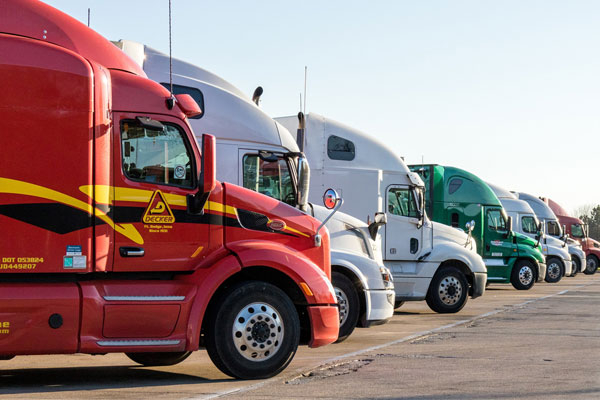25 Jul Changes to Massachusetts State Marking Regulations for Commercial Vehicles
Own a business and/or have vehicles with commercial license plates? The new Massachusetts state marking regulations may affect you.
The state police have been out in force on roadways lately, and not just because it’s summer when tempers tend to flare and accident rates rise. This year, they are also trolling large commercial vehicles, and pulling many of them over, to see if they are in compliance with two new Massachusetts State Marking Regulations that require putting a DOT number and the company’s name on the vehicle.
 For now, drivers who are not in compliance are free to go after receiving a friendly heads-up, and possibly a notice, that these regulations are about to go into effect. However, come September 1, 2018, these new rules will officially be on the books. So, after that date, any driver pulled over in a vehicle subject to these requirements, but not yet meeting them, could be heavily fined plus have their vehicle confiscated and placed out of service
For now, drivers who are not in compliance are free to go after receiving a friendly heads-up, and possibly a notice, that these regulations are about to go into effect. However, come September 1, 2018, these new rules will officially be on the books. So, after that date, any driver pulled over in a vehicle subject to these requirements, but not yet meeting them, could be heavily fined plus have their vehicle confiscated and placed out of service
Below, we’ve provided some additional information about these new regulations. However, if you have questions or concerns about how these requirements might affect you, your business, and your vehicles, we strongly encourage you to seek advice from a transportation compliance specialist. Check with any trade groups you belong to, or transportation consultants in Massachusetts, such as Fleet Safety Services, Inc. or The Transportation Advisor, Inc., for helpful and knowledgeable advice on this issue.
What are the two Massachusetts State Marking changes?
Every motor vehicle engaged in intrastate commerce, meaning you perform trade, traffic or transportation exclusively in the state of Massachusetts, and having a gross vehicle weight rating or gross combination weight rating of 10,001 or more pounds, must be permanently marked with a USDOT number.
In addition, these vehicles must clearly display the legal name of the business. Or, if the company is a DBA, then the name of the registered owner of the vehicle must be visible.
There are strict guidelines for how this information should be displayed, including that the company name and USDOT number must be:
- Plainly visible from each side of the truck or from the front and rear of the vehicle
- On the truck body, not on window glass
- In permanent letters that contrast sharply in color with the background on which the letters are placed
- Readily legible during daylight hours from a distance of 50 feet while the vehicle is stationary
It’s also critical that you continue to maintain the legibility of these markings over time.
What types of vehicles are affected?
If you use heavy duty pickup trucks, panel trucks, walk-in vans, big box trucks, cargo vans, large utility vehicles, bucket trucks, or any other type of large commercial vehicle, for business purposes, then you are most likely subject to this new regulation and will need to display your company’s USDOT number and legal name on every single one of your commercial vehicles.
In addition, it’s important to know that there are other vehicles that are subject to this USDOT number requirement, including motor vehicles used to transport:
- Hazardous materials in a quantity requiring containers, tanks or drums
- More than 15 passengers, including the driver, and are used in intrastate commerce, such as large vans or buses used by private transportation companies
What is the process for getting a USDOT number?
You can get a USDOT number by going to the Federal Motor Carrier Safety Administration (FMCSA) website. Since there is no cost to getting a USDOT number and the September 1st deadline is looming, there’s no reason to delay starting this process.
What are the reasons behind these new Massachusetts State Marking regulations?
Massachusetts state authorities expect the new regulations to bring more transparency to business activities and safety to our roadways. Specifically, both law enforcement officials and the Massachusetts Department of Transportation anticipate that these tougher requirements will help them:
- Improve the current commercial vehicle tracking system
- Increase visibility of vehicles used for business purposes
- Quickly access information about the parties involved at the scene of an accident or any other traffic violation
- Simplify the lookup process for a company’s safety rating data, which includes prior inspection violations, crash counts, and audit and compliance reviews
- Improve overall safety performance of commercial motor vehicles
- Reduce commercial motor vehicle-related fatalities and injuries
- Remove high-risk commercial motor vehicle drives from our highways
Only time will tell if these new regulations truly can have this powerful of an impact. But, if they do, it would be a win for not just the state, but also for the public and businesses like yours because everyone benefits from less dangerous roadways.
Why is this happening now?
These new regulations may seem like a sudden change, but, in fact, they are based on current federal DOT regulations for interstate commercial vehicles. In other words, motor vehicles traveling across state lines to conduct business were previously required to display this same information.
Now, with the recent changes, Massachusetts intrastate marking requirements will align with these established interstate marking requirements. In addition, a majority of other states across the U.S. have adopted these same requirements, including our neighbors, Maine, New York, and New Jersey.
 So, while the initial work of applying for your USDOT number and paying for the lettering to display your business name and DOT number on your company vehicles might take a little time and a small investment, your vehicles should be adequately labeled for any type of commerce in the state of Massachusetts and beyond. If it sounds like your business vehicle(s) may be subject to these new requirements, then we recommend you continue to research these rule changes to avoid any of the consequences of non-compliance. The RMV will continue to have the most up-to-date information about both of these changes, including the business vehicles that may qualify for an exception.
So, while the initial work of applying for your USDOT number and paying for the lettering to display your business name and DOT number on your company vehicles might take a little time and a small investment, your vehicles should be adequately labeled for any type of commerce in the state of Massachusetts and beyond. If it sounds like your business vehicle(s) may be subject to these new requirements, then we recommend you continue to research these rule changes to avoid any of the consequences of non-compliance. The RMV will continue to have the most up-to-date information about both of these changes, including the business vehicles that may qualify for an exception.
Still need help determining if and how the new MA state marking requirements may affect you and your business vehicles? Contact either one of these Massachusetts transportation compliance experts:
Fleet Safety Services
Worcester, MA
(800) 215-2490
The Transportation Advisor
Palmer, MA
(800) 608-8890
Your HUB International professionals, like our Vice President of Risk Management Ben Garvey, are also available anytime to answer your questions about commercial auto insurance, to review your current policies, or for help making an informed decision about protecting your business vehicles. If you are ready for a more personal relationship with a trusted insurance agent who is always looking out for you and your business, then call us today at 833-GoCallHUB or stop into any one of our three convenient Massachusetts offices.


No Comments